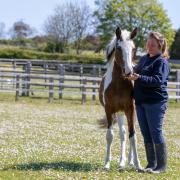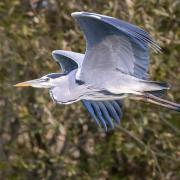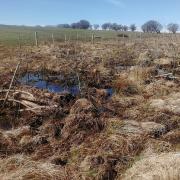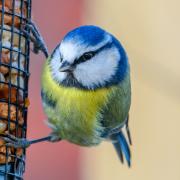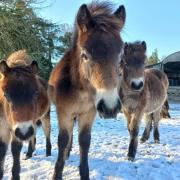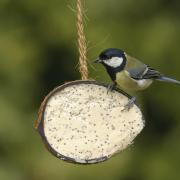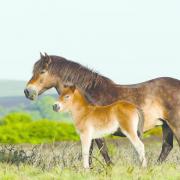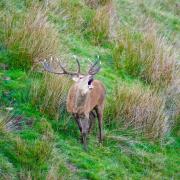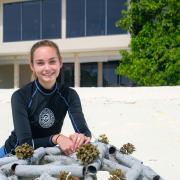Rachael Sharpe talks to Kim Williams about life in Somerset with a herd of 21 alpacas

Sometimes finding ones calling in life happens in the strangest of ways. This is certainly true for Kim Williams, owner of Cary Alpacas.
Kim was actually working for HM Prison Service when she decided to leave her role and become 'an alpaca lady'. "On a warm sunny day, my responsibility was to search prisoners exiting the prison to carry out work experience. They told me that they were working within an alpaca farm locally. It didn't take me long to speak with the owner and arrange to his farm shortly after. Wasting no time whatsoever, Cary Alpaca was born later in the same year," Kim tells me.
Kim tells us she's always been an animal lover, but never had the opportunity to own any due to work commitments. Before working for HM Prison Service, she spent 22 years in the Women's Royal Navy Service and for Avon & Somerset Constabulary as a Police Community Support Officer among other jobs.
Kim explains: "These jobs were never 9-5 jobs and often shifts would be extended for various reasons."
Together with her partner, Linda, Kim found a wonderful local breeder in Sue Thomas, of Lyme Alpacas. After many visits to her farm, the couple eventually selected their `starter pack' of three adult females and two young females.
"Our business plan was to halter show our alpacas and to breed cria (baby alpaca) and sell them," explains Kim.
However, showing turned out not be for Sue and neither was breeding…
"We had our first three cria born in 2014 and since then we have not been able to part with them - we will never be business women of the year," she laughs.

The year 2016 saw four more cria born at Cary Alpacas and, like the others, they are still present. Abandoning the showing and breeding business plan allowed Cary Alpaca to flourish in keeping alpaca and now Kim concentrates on the trekking and experience side of the business.
These days life really couldn't be much different from the 9-5 grind for Kim, with 21 alpacas to care for in total and the beautiful Somerset countryside to walk them in.
"I love the wildlife that surrounds us, the country colours of uninterrupted blue skies, the changing colours of the trees through the seasons, the various crops growing and the beautiful walks," she says, talking of her life in Cary Fitzpaine, where she and Linda have lived since 2003.
Most of Kim's alpacas are happy to walk and the others remain in their paddocks. When people come to walk them, they walk around the beautiful fields belonging to local farmer, Andrew Crang, of Cary Fitzpaine Farm.
"We have all ages booking for a Cary Alpaca experience - from people on their own and families to hen and birthday parties. Since we commenced the experiences our numbers have risen each year," enthuses Kim.
Indeed, since the walks were launched, more than 900 people have walked the magnificent, gentle and inquisitive animals.
Alpaca wool is known as `fibre of the gods' - it's hypoallergenic, keeps you warm in the winter, cool in the summer, repels water and is non-flammable. Indeed, prestigious designer Armani has used the fibre from Suri alpacas in both men and women's suits.
"We keep our produced balls in a natural colour although we may mix a couple of colours together. We sell through our website, at shows and in our onsite shop for those attending an experience day," says Kim.
It's clear there's a lot to taking care of Kim's herd of alpaca and something she does tremendously well - they are a credit to her and bring joy to everyone who walks them.
Alpaca care
Although Alpacas only require grass, good quality hay and water during the summer months, Kim also offers a little hard feed each day. This encourages her alpacas to come to the feed buckets so that she can check for any abnormal behaviour or lameness.
During the winter months when grazing is poor, she supplements with a little more hard feed and more hay. Also, from September through to March Kim administers vitamins A, D and E as a drench known as `Liquid Sunshine'.
The alpacas mainly sleep out in the open but when there is heavy rain and strong winds they normally take refuse in their shelter, which also provides good protection from the sun.
Kim also has to protect the alpacas from a group of diseases present in the soil that can be picked up. She also has a regime for worming and parasite control and carries out monthly health checks, which includes all the alpacas being weighed, body scored and toe nails and teeth checked.
Did you know....?
- Alpacas are ancient. They were domesticated by the Incas more than 6,000 years ago for their wonderful fleece.
- Alpacas are fire proof. Their fleece is naturally flame-resistant.
- There are two types of alpacas: Suri (long silky fibre) and huacaya (woolly, dense, crimped fleece).
For more information, visit caryalpacas.co.uk.






